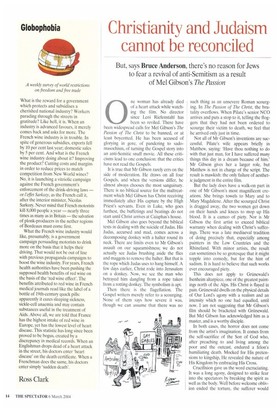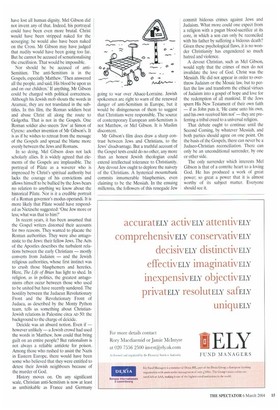Christianity and Judaism cannot be reconciled
But, says Bruce Anderson, there's no reason for Jews to fear a revival of anti-Semitism as a result of Mel Gibson's The Passion 0 ne woman has already died of a heart attack while watching the film. No director since Leni Riefenstahl has been so reviled. There have been widespread calls for Mel Gibson's The Passion of The Christ to be banned, or at least boycotted. He has been accused of glorying in gore, of pandering to sadomasochism, of turning the Gospel story into an anti-Semitic snuff movie. All these criticisms lead to one conclusion: that the critics have not read the Gospels.
It is true that Mr Gibson rarely errs on the side of moderation. He draws on all four Gospels, and when the versions differ, he almost always chooses the most sanguinary. There is no biblical source for the maltreatment which Mel Gibson has Christ receiving immediately after His capture by the High Priest's servants. Even in Luke, who goes furthest, the buffetings and beatings do not start until Christ arrives at Caiaphas's house.
Mel Gibson also goes beyond the biblical texts in dealing with the suicide of Judas. His Judas, accursed and mad, comes across a decomposing donkey with a halter round its neck. There are limits even to Mr Gibson's assault on our squeamishness; we do not actually see Judas brushing aside the flies and maggots to remove the halter. But that is the rope which Judas uses to hang himself. A few days earlier, Christ rode into Jerusalem on a donkey. Now, we see the man who betrayed him dangling from a rope taken from a rotting donkey. The symbolism is apt.
Then there is the flagellation. The Gospel writers merely refer to a scourging. None of them says how severe it was, though we can assume that there was no
such thing as an unsevere Roman scourging. In The Passion of The Christ, the brutality overflows. When Pilate's senior NCO arrives and puts a stop to it, telling the floggers that they had not been ordered to scourge their victim to death, we feel that he arrived only just in time.
Not all of Mr Gibson's inventions are successful. Pilate's wife appears briefly in Matthew, saying: 'Have thou nothing to do with that just man, for I have suffered many things this day in a dream because of him.' Mr Gibson gives her a larger role, but Matthew is not in charge of the script. The result is mawkish: the only failure of aesthetic judgment in the entire film.
But the lady does have a walk-on part in one of Mr Gibson's most magnificent creations. She brings towels to Mary and to Mary Magdalene. After the scourged Christ is dragged away, the two women get down on their hands and knees to mop up His blood. It is a cameo of piety. Nor is Mr Gibson the first artist to exceed biblical warranty when dealing with Christ's sufferings. There was a late mediaeval tradition of doing precisely that, especially among painters in the Low Countries and the Rhineland. With minor artists, the result can sometimes be so grotesque that it might topple into comedy, but for the hint of sadism. It is hard to believe that such works ever encouraged piety.
This does not apply to Grunewald's Isenheim altarpiece, one of the greatest paintings north of the Alps. His Christ is flayed in pain. Grunewald dwells on the physical details of Our Lord's agony with a realism and an intensity which no one had equalled, until now. I am not suggesting that Mr Gibson's film should be bracketed with Griinewald. But Mel Gibson has acknowledged him as a master, and is a worthy disciple.
In both cases, the horror does not come from the artist's imagination. It comes from the self-sacrifice of the Son of God who, after preaching to and living among the poor and the outcast, endured a felon's humiliating death. Mocked for His pretensions to kingship, He revealed the nature of His Kingdom by embracing His Cross.
Crucifixion gave us the word excruciating. It was a long agony, designed to strike fear into the spectators by breaking the spirit as well as the body. Well before welcome oblivion ended the torture, the sufferer would
have lost all human dignity. Mel Gibson did not invent any of that. Indeed, his portrayal could have been even more brutal. Christ would have been stripped naked for the scourging; he would also have been naked on the Cross. Mr Gibson may have judged that nudity would have been going too far. But he cannot be accused of sensationalising the crucifixion. That would be impossible.
Nor should he be accused of antiSemitism. The anti-Semitism is in the Gospels, especially Matthew. 'Then answered all the people, and said, His blood be upon us and on our children.' If anything, Mr Gibson could be charged with political correctness. Although his Jewish mob shouts the words in Aramaic, they are not translated in the subtitles. In this film, the Roman soldiers beat and abuse Christ all along the route to Golgotha. That is not in the Gospels. One Roman soldier also sneers `Jew' at Simon of Cyrene: another invention of Mr Gibson's. It is as if he wishes to retreat from the message of the Gospels and spread the blame more evenly between the Jews and Romans.
In so doing, Mel Gibson does not lack scholarly allies. It is widely agreed that elements of the Gospels are implausible. The portrayal of Pilate as a waverer who is impressed by Christ's spiritual authority but lacks the courage of his convictions and allows himself to be bullied by the Jews bears no relation to anything we know about the historical Pilate. Nor is it a credible portrait of a Roman governor's modus operandi: It is more likely that Pilate would have responded as Nietzsche suggested: 'One Jew more or less; what was that to him?'
In recent years, it has been assumed that the Gospel writers distorted their accounts for two reasons. They wanted to placate the Roman authorities, They were also antagonistic to the Jews: their fellow Jews. The Acts of the Apostles describes the turbulent relations between the early Christians — mostly converts from Judaism — and the Jewish religious authorities, whose first instinct was to crush those blasphemers and heretics. Here, The Life of Brian has light to shed. In religion, as in politics, the greatest antagonisms often occur between those who used to be united but have recently sundered, The hostility between the Judaean Revolutionary Front and the Revolutionary Front of Judaea, as described by the Monty Python team, tells us something about ChristianJewish relations in Palestine circa AD 50: the background to the charge of deicide.
Deicide was an absurd notion. Even if — however unlikely — a Jewish crowd had used the words in Matthew, how could that bring guilt on an entire people? But rationalism is not always a reliable antidote for poison. Among those who rushed to assist the Na7is in Eastern Europe, there would have been some who believed that they were entitled to detest their Jewish neighbours because of the murder of God.
History moves on. On any significant scale, Christian anti-Semitism is now at least as unthinkable as France and Germany going to war over Alsace-Lorraine. Jewish spokesmen are right to warn of the renewed danger of anti-Semitism in Europe, but it would be disingenuous of them to suggest that Christians were responsible. The source of contemporary European anti-Semitism is not Matthew, or Mel Gibson. It is Muslim discontent.
Mr Gibson's film does draw a sharp contrast between Jews and Christians, to the Jews' disadvantage. But a truthful account of the Gospel texts could do no other, any more than an honest Jewish theologian could extend intellectual tolerance to Christianity. Any devout Jew ought to deplore the naivety of the Christians. A hysterical mountebank commits innumerable blasphemies, even claiming to be the Messiah. In the ensuing millennia, the followers of this renegade Jew commit hideous crimes against Jews and Judaism. What more could one expect from a religion with a pagan blood-sacrifice at its core, in which a son can only be reconciled with his father by suffering a hideous death? Given these psychological flaws, it is no wonder Christianity has engendered so much hatred and violence.
A devout Christian, such as Mel Gibson, would reply that the crimes of men do not invalidate the love of God. Christ was the Messiah. He did not appear in order to overthrow Judaism or the Mosaic law, but to perfect the law and transform the ethical virtues of Judaism into a gospel of hope and love for the redemption of all mankind. If the Jews spurn His New Testament of their own faith — if as John puts it, 'He came unto his own, and his own received him not' — they are preferring a tribal creed to a universal religion.
That debate ought to continue until the Second Coming, by whatever Messiah, and both parties should agree on one point. On the basis of the Gospels, there can never be a Judaeo-Christian reconciliation. There can only be an unconditional surrender, by one or other side.
The only surrender which interests Mel Gibson is that of a contrite heart to a loving God. He has produced a work of great power; so great a power that it is almost worthy of its subject matter. Everyone should see it.



















































































 Previous page
Previous page